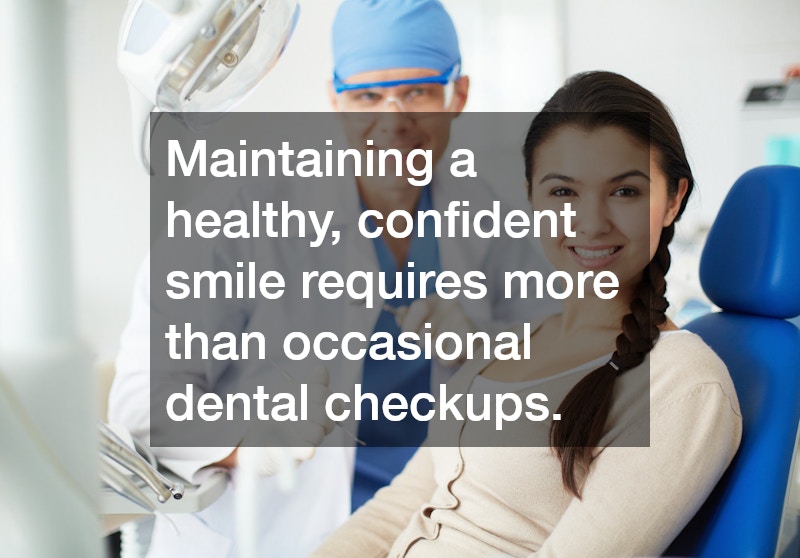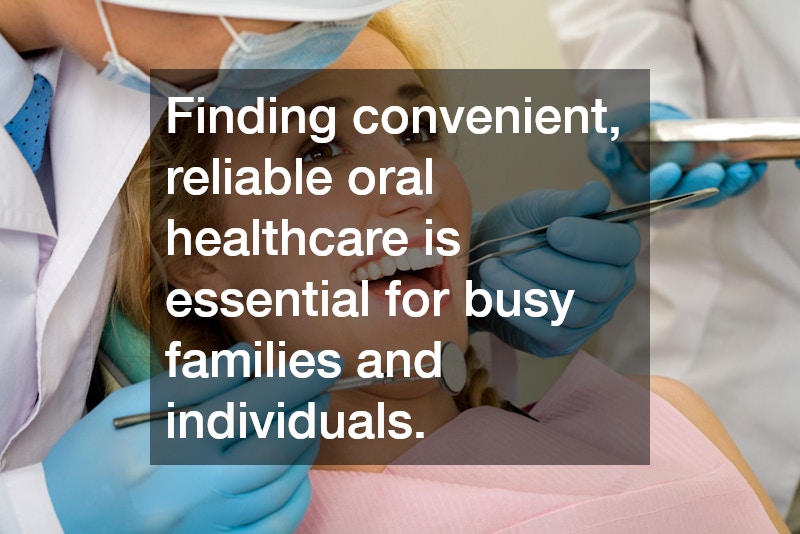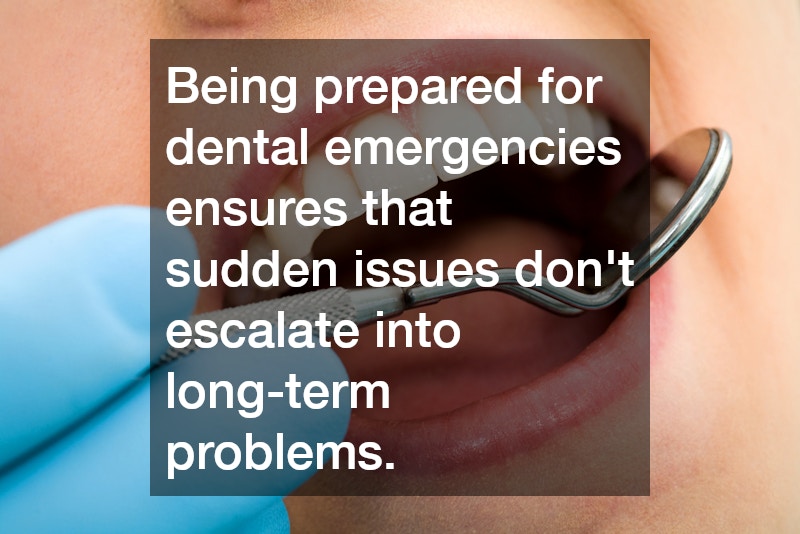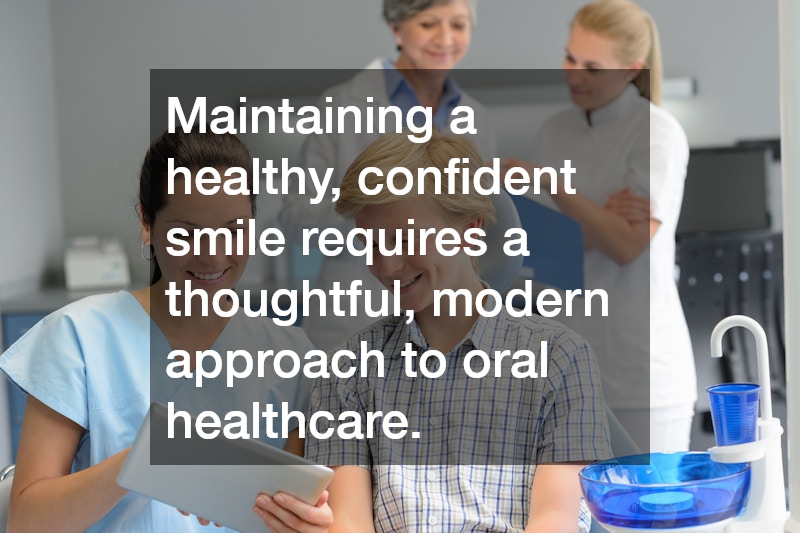Maintaining a healthy, confident smiles requires more than occasional dental checkups. Today’s patients expect comprehensive care, advanced technology, and flexible access to treatment. A modern approach to oral health focuses on prevention, quick response to urgent concerns, cosmetic enhancements, and long-term solutions that support both function and aesthetics. It also involves choosing healthcare professionals who prioritize comfort, education, and individualized treatment. By understanding how to navigate your options and select the right providers, you can ensure lifelong oral health and a brighter, more confident smile.
Oral healthcare today goes beyond simply addressing cavities or gum issues. Preventive strategies, such as regular cleanings, screenings, and patient education, play a critical role in avoiding more complex treatments later. Advances in technology, including digital imaging, laser therapy, and minimally invasive procedures, allow dentists to detect and treat problems earlier, reducing discomfort and recovery time. Cosmetic and restorative services, such as dental implants, bridges, or teeth whitening, can improve both function and appearance, giving patients renewed confidence in their smiles.
Flexibility is another key aspect of modern dental care. Access to walk-in clinics, emergency services, and tailored treatment plans ensures that patients can receive timely attention when unexpected issues arise. Furthermore, understanding insurance coverage and employee healthcare plans helps families and individuals make informed financial decisions while prioritizing their oral health. Combining prevention, innovation, and accessibility creates a comprehensive approach that supports strong, healthy, and confident smiles for years to come.

Building a Strong Foundation With Accessible Care Options
Finding convenient, reliable oral healthcare is essential for busy families and individuals. The right dental office should offer a welcoming environment, streamlined scheduling, and a team committed to patient comfort. When choosing where to go for routine cleanings or exams, accessibility and flexibility matter. A location that offers evening or weekend appointments makes it easier to prioritize preventive care without disrupting daily responsibilities.
At the same time, it’s helpful to choose providers who take the time to explain treatment options, understand your medical history, and personalize care to your needs. Many practices now offer digital forms, online appointment systems, and automated reminders to make visits stress-free. Whether you’re managing oral health for yourself or your entire household, selecting a reliable provider sets the stage for long-term wellness.
During urgent situations, delayed treatment can intensify pain or increase the risk of complications. That’s where having quick access to an emergency dentist becomes essential. Sudden issues such as severe toothaches, chipped teeth, or infections need immediate evaluation to prevent long-term damage. Knowing where to go in an emergency gives you peace of mind and ensures timely treatment when every minute matters.
Creating a Family-Centered Care Routine
Consistency is the cornerstone of effective oral health, especially for children and older adults. A trusted family dentist makes it easier to manage care for multiple people under one roof. These providers understand the different needs that arise during each stage of life—baby teeth, orthodontic considerations, aging restorations, and more. With a familiar team, children feel more comfortable, adults get personalized care, and seniors receive support for restorative needs.
Family practices also keep comprehensive records, track developmental changes, and provide preventive guidance tailored to each person’s habits and risk factors. Their ability to treat patients of all ages encourages continuity, helping families avoid gaps in care and maintain healthier smiles throughout the years.
In addition to preventive care, families benefit from emergency preparedness. Having trusted emergency dentists ensures support is available during unexpected issues like broken fillings, dental trauma, or infections. Knowing exactly who to call eliminates confusion and reduces stress—especially for parents managing sudden dental needs for children.
Elevating Appearance With Advanced Cosmetic Solutions
Confidence often starts with a beautiful smile. Modern cosmetic dental care goes far beyond basic whitening, offering solutions that correct discoloration, misalignment, chips, gaps, and uneven tooth shapes. High-quality aesthetic treatments can completely transform a person’s appearance and self-esteem, improving comfort in social and professional situations.
Cosmetic services might include veneers, bonding, clear aligners, gum contouring, or full smile makeovers. Each treatment plan is designed with precision to complement facial features and enhance natural beauty. Many providers offer digital smile previews so patients can visualize results before treatment begins.
For individuals seeking long-term replacements for missing teeth, restorative and cosmetic goals often overlap. Custom-designed solutions like a dental bridge provide structural stability, improved function, and a natural appearance. Bridges are securely anchored to surrounding teeth, blending seamlessly while restoring the ability to chew and speak comfortably. When combined with professional cosmetic services, they help create a complete, balanced transformation.

Exploring Long-Lasting Restorative Treatment Options
Restoring missing teeth or correcting damaged structures is essential for oral health, confidence, and long-term function. Modern replacement solutions are more durable, comfortable, and visually appealing than ever before.
One of the most popular long-term solutions is dental implant procedures, which replace missing tooth roots with titanium posts that support crowns, bridges, or dentures. Implants look and feel natural, prevent bone loss, and last many years with proper care. They also allow patients to enjoy restored bite strength and improved overall oral health.
Patients deciding between implants, bridges, and other restorative options should consider factors such as jawbone condition, medical history, lifestyle needs, and long-term goals. Understanding the pros and cons of each solution helps individuals make informed decisions that align with their budget and personal preferences.
A custom dental bridge may be recommended when implants are not ideal or when patients prefer a faster, less invasive option. Bridges are carefully crafted to blend with surrounding teeth and can significantly improve comfort and appearance. When paired with regular checkups and proper home care, bridges can last for many years while maintaining excellent function.
Enhancing Comfort and Confidence With Updated Patient Environments
Modern oral healthcare is about more than treatment—it’s also about creating environments where patients feel at ease. Updated facilities, calming décor, and modern equipment contribute to a better overall experience. Practices that undergo thoughtful dental clinic renovation often provide more efficient workflows, improved hygiene standards, and greater accessibility for patients with mobility concerns.
Renovated clinics tend to incorporate technology that reduces treatment time, improves accuracy, and increases comfort. Digital X-rays, 3D scanners, and advanced sterilization systems help ensure patients receive care that is both safe and precise. These upgrades also support more accurate diagnoses, allowing providers to develop treatment plans tailored to each patient’s needs.
Improved waiting areas, private consultation rooms, and ergonomic dental chairs also promote a stress-free environment. Patients who feel comfortable during treatment are more likely to maintain consistent care and return for follow-up appointments.

Expanding Access Through Convenient and Flexible Care Options
Not every dental need requires a scheduled appointment far in advance. For unexpected situations or urgent concerns, having access to a walk in clinic provides flexibility and reassurance. These clinics allow patients to receive timely care without the pressure of scheduling weeks ahead, making it easier to address issues like minor injuries, sudden discomfort, or concerns that arise during busy workweeks.
Walk-in services are especially beneficial for parents managing children’s dental emergencies, workers with irregular schedules, and individuals who may be experiencing anxiety about delaying treatment. The convenience of same-day access helps patients avoid complications and maintain better long-term oral health. Many walk-in clinics also offer extended hours, quick triage, and streamlined processes that reduce waiting times, making care more approachable for those who might otherwise postpone a necessary visit. This level of accessibility creates a safety net for patients who need help fast but cannot wait for a traditional appointment.
The ability to receive prompt attention is particularly important for issues like infections, fractured teeth, or lost fillings, where early treatment can prevent pain from worsening or spreading. In many cases, walk-in clinics can stabilize the condition and schedule follow-up treatment when needed, preventing small issues from turning into major procedures.
Beyond clinical flexibility, financial support is also essential. Understanding coverage options, benefits, and reimbursement processes allows patients to plan treatment with confidence. Many individuals access oral healthcare through employer-sponsored employee healthcare plans, which may cover preventive care, emergency treatments, and restorative services. Reviewing plan details carefully helps families maximize benefits and reduce out-of-pocket costs. It also ensures patients know whether emergency visits, walk-in assessments, X-rays, and necessary follow-up care fall within their coverage. When patients understand their benefits, they are more likely to seek care promptly rather than delaying treatment due to financial uncertainty.
Planning for Oral Health Emergencies and Unexpected Needs
Being prepared for dental emergencies ensures that sudden issues don’t escalate into long-term problems. Quick access to care is especially critical after injuries, severe pain, or unexpected accidents. One example is knowing where to seek help after vehicle-related injuries, where involvement from a car accident attorney may be necessary due to the nature of the incident. Traumatic impacts can cause chipped teeth, jaw pain, or damaged dental restorations that require immediate evaluation.
A second instance where timely communication between medical and dental care providers matters involves collaborative support after incidents handled by a car accident attorney. In these situations, proper documentation of dental injuries may be needed, and emergency providers can help ensure treatment records accurately reflect the extent of damage. This level of coordination supports both physical recovery and any legal considerations tied to the incident.
Beyond vehicle-related injuries, other sudden dental emergencies—such as severe infections, abscesses, or sudden toothaches—also demand immediate attention. Having access to an emergency dentist or walk-in dental clinic ensures that pain is managed quickly and complications like tooth loss or systemic infection are prevented. Patients should also be familiar with the clinic’s procedures for after-hours emergencies, including phone consultation or urgent appointments.
By having a clear plan for emergencies—including where to go, whom to contact, and what documentation may be needed—patients can face unexpected challenges with greater confidence. Emergency preparedness also protects long-term oral health, ensuring injuries are treated quickly and appropriately. Additionally, families should educate children and household members on steps to take if a dental emergency occurs, reinforcing safe practices and reducing stress during urgent situations. Taking these precautions ensures both immediate relief and the preservation of healthy, functional smiles over time.
Creating a Personalized Long-Term Oral Care Strategy
Oral health is an ongoing journey that requires regular maintenance, professional guidance, and a proactive mindset. Personalized strategies help patients address unique needs and prevent issues from developing over time. A strong partnership with skilled providers ensures you receive the right treatments at the right time.
Long-term strategies often include:
-
Twice-yearly cleanings and exams
-
Periodic X-rays to monitor underlying structures
-
Professional cleanings to prevent gum disease
-
Regular evaluation of restorations like fillings, crowns, or bridges
-
Customized plans for whitening, cosmetic improvements, or restorative needs
-
Education on home-care habits, tools, and techniques
Patients who follow consistent routines enjoy stronger teeth, healthier gums, and more attractive smiles throughout their lives.
Maintaining a healthy, confident smile requires a thoughtful, modern approach to oral healthcare. By choosing skilled professionals, staying consistent with preventive care, and taking advantage of flexible and comprehensive treatment options, you can support long-term oral wellness and a renewed sense of confidence. Understanding your options empowers you to make informed decisions that protect your health, comfort, and well-being for years to come. Whether you’re addressing cosmetic goals, managing emergencies, or creating a routine for your entire household, the right care team can make every step of the journey more effective and more comfortable.
Equally important is fostering open communication with your dental care providers. Sharing your concerns, preferences, and medical history allows professionals to tailor treatments that align with your lifestyle and goals. Modern dental offices offer a wide range of services, from routine cleanings and preventive care to cosmetic enhancements like dental implants or bridges, ensuring that every patient receives individualized attention. Being proactive in scheduling regular checkups, monitoring changes in oral health, and seeking timely care for unexpected issues reduces the risk of complications and promotes overall wellness.
In addition to clinical care, patients benefit from understanding financial and insurance considerations. Employee healthcare plans or other coverage options can help make treatments more accessible and reduce stress about costs. Educating yourself on coverage details, in-network providers, and out-of-pocket expenses ensures that you can make confident decisions about the care you and your family receive.
Ultimately, investing time and effort in a comprehensive, proactive approach to oral health fosters more than just physical well-being—it enhances self-esteem, social confidence, and quality of life. With the guidance of experienced dental professionals, you can enjoy a smile that is not only attractive but resilient and healthy, supporting your overall wellness for years to come.

